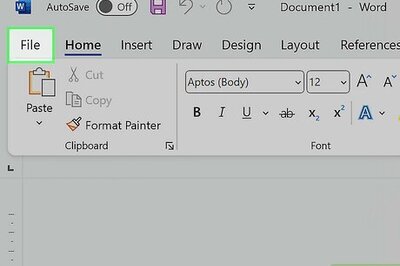
views
From 1 June, customers will be able to transfer funds through the Real Time Gross Settlement (RTGS) system till 6 pm as opposed to 4:30 pm earlier, the Reserve Bank of India (RBI) announced on Tuesday.
The RTGS transactions will now take place under three windows during the day: 8 am to 11 am, 11 am to 1 pm, and 1 pm to 6 pm. While customers who conduct transactions in the first window won’t have to pay any additional fee over and above the fixed processing charge, the second and third window users will have to pay an additional Rs 2 and Rs 5, respectively. The banks normally charge anywhere between Rs 30 and Rs 55 for a single RTGS transaction.
Here are a few more things you should know if you are new to the world of online money transfer modes and plan to use RTGS in the near future:
-- The three most commonly used fund transfer methods in India are NEFT (National Electronic Funds Transfer), RTGS and IMPS (Immediate Mobile Payment Service).
-- All these three methods let you transfer money from one account to another, but each method is slightly different from the other in terms of timings, fund transfer limit, charges etc.
-- NEFT vs RTGS: NEFT transactions are settled in hourly batches, while RTGS transactions are settled individually on a real-time basis. This basically means that when it comes to NEFT transactions, the settlement does not take place unless a certain number of transactions are received until a certain cut-off time. On the other hand, RTGS transactions are processed as and when they are received.
Simply put, in NEFT, if you initiate a fund transfer after the settlement time, you have to wait for the next settlement time for the transaction to be processed. While in RTGS, the fund transfer is immediate.
-- RTGS is typically meant for larger value transactions and the minimum amount that can be sent via this mode is Rs 2 lakh. Banks have the liberty to decide their own upper limit as RBI has not set any ceiling cap for RTGS transactions.
-- Meanwhile, in case of cash-based remittances within India and to Nepal, NEFT allows you to transfer only a maximum of Rs 50,000.
-- RTGS vs IMPS: IMPS is an instant fund transfer service, like RTGS, but it typically caters to fund transfers of lower amounts. The maximum amount you can transfer through IMPS is Rs 2 lakh. For transferring higher amount, you will have to opt RTGS mode.
-- With IMPS, funds can be transferred any time during the week or weekends throughout the year. NEFT and RTGS are not available on Sundays, and the 2nd and 4th Saturdays of the months. They are also not available on bank holidays.
-- Charges: RTGS is slightly expensive as compared to NEFT and IMPS, but arguably so because it allows larger value transactions on a realtime basis. As mentioned earlier, banks can charge up to Rs 55 for an RTGS transaction, whereas NEFT and IMPS charges generally won’t exceed Rs 20.

















Comments
0 comment